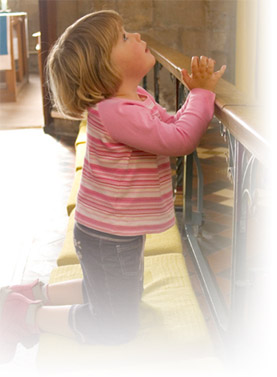Sunday Sermon for March 19, 2017, the Third Sunday of Lent, Year A
Readings: Ex 17:3-7; Rom 5:1-2, 5-8; Jn 4:5-42
As we make our way through Lent, if things are going spiritually the way they should, it is probable that two things have occurred. The first is that you may have fallen a time or two regarding your Lenten penance. The second is that you are recognizing your weakness and, therefore, your sinfulness more than ever. When this happens we realize our unworthiness to be a Christian person, to be united with our Lord, or to receive any of His gifts, especially the forgiveness of our sins and the Holy Eucharist.
At the same time that this realization is taking place, there is the concomitant recognition of our absolute need for forgiveness of sins and for receiving our Lord in Holy Communion. This is one of the glorious things about Lent: we have a greater appreciation for the love and mercy of God due to our deeper understanding of our own brokenness.
Whenever we think about our unworthiness of God’s mercy (and we must be clear that we are absolutely unworthy and that there is nothing we can do by our own ability to become worthy) we may be tempted to give in to hopelessness and despair of God’s mercy. In order to counter such a movement, the Lord has provided us with many examples in the Scriptures as well as in the lives of the Saints that will bolster our confidence. This confidence, it must be understood, is not in ourselves, but in the Lord.
In the readings today we have several instances of God showing His mercy to those we might consider completely undeserving of His mercy. In the first reading we hear about the Hebrew people out in the desert. The people were frustrated because they were tired, hungry, thirsty, and hot. They did what most of us would do: they whined, they grumbled, and they failed to trust in the Lord. Moses even stated that “a little more and they will stone me.”
In the Gospel reading we hear about the Samaritan woman who meets our Lord at Jacob’s well. Because of her circumstances, she was an outcast who came to draw water at noon in order to avoid the other people who came to draw water at the cooler times of day. She had been married and divorced five times and was presently living with another man. Still, Jesus asks her for a drink and invites her to ask for “living water.”
In each of these occasions we see the mercy of God being extended to people who are not even repentant for their sins. God provides water from the rock. It would be one thing to lead the people to a spring of water, but to provide in such an extraordinary manner showed them the power of God, but even more, the love of God for them.
To the woman at the well (St. Photina) Jesus reveals His identity as the Messiah, and she becomes something of an evangelist to the Samaritans. Even though they had relegated her to the periphery of the society, she is able to enter into the heart of the town and gain a hearing from the people who had previously held her in contempt.
It is interesting to note that it is precisely her sinfulness that God used as the means to help her recognize the Christ. It is this same sinfulness that brings our Lord to reveal Himself as the Messiah; she responds with an act of faith. It is His knowledge of her sinfulness that is the basis for her announcing our Lord’s presence among her townsfolk. The fact of her being ostracized by the rest of the town suggests that there were many other people in the town who were leading, at least externally, better lives than she. However, God chose the sinful woman and converted her heart, then used her conversion as the means to bring others to conversion.
St. Paul, in the second reading, reminds us that what is true of St. Photina is true for us as well. He says that God proves His love for us in that while we were still sinners Christ died for us. Like the woman of Samaria, it is now our turn to acknowledge the mercy of God. He chose us because we are sinners, not because we were living such upright and holy lives. He chose us because we would be able to be an example to others of God’s mercy. Someone who knows us can say: “If God can have mercy on you, then He can have mercy on me.”
This can only happen if we recognize our sinfulness and, therefore, our unworthiness. We are not worthy, therefore, our unworthiness proves God’s love and commissions us to become evangelists to tell others of the gift of God.
Fr. Altier’s column appears regularly in The Wanderer, a national Catholic weekly published in St. Paul, Minn. For information about subscribing to The Wanderer, please visit www.thewandererpress.com.

